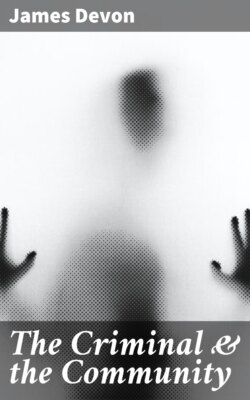Читать книгу The Criminal & the Community - James Devon - Страница 8
На сайте Литреса книга снята с продажи.
CHAPTER IV
ОглавлениеTable of Contents
PHYSICAL DEFECTS AND CRIME
Physical defects beget sympathy—Rarely induce crime—May cause mental degeneration—Case of jealousy and murder.
Just as some degree of mental deficiency is not incompatible with the ability to live a peaceable and useful life, physical defects do not necessarily unfit a man to discharge his duties as a citizen. In either case the sphere of his usefulness is limited, but that is all that can be said. Much will depend on his social position.
When a person who is physically defective falls into evil courses, it appears likely that he should find it more difficult to return to the right path than one who is healthy and complete in all his parts; but this expectation leaves out of account the fact that the more pitiable and abandoned a man is the more does his condition appeal to the charitable. His very helplessness attracts attention and begets for him a consideration not given to those who are stronger; and if he will but place himself in their hands, there are many willing to look after the lost sheep whose condition is so pitiable. In some respects, and as things are at present, there is less need for anyone who suffers from physical disability taking to crime than for an ordinary citizen; for the law provides for him and prevents him suffering from destitution in respect that he is disabled.[1]
Physical defects are in very few cases the cause of offences. They narrow the opportunities of employment, and they lessen the chances of work even though the defect may not be of such a nature as to unfit a man for it; but except in so far as they may result in destitution—which, if due to disability, must be relieved by the Parish on application—they rarely induce crimes. In some cases, however, serious crime can be traced to this cause.
X 11 was an energetic and industrious man. He was a teetotaler and took an active interest in local affairs. He was respected and trusted by his fellow-workmen and took a leading part in the trade and friendly societies to which he belonged. He also had an interest in books; read a good deal, considering his opportunities; and exercised his intelligence beyond most of his neighbours. He married a suitable partner and their family life was an evenly happy one. In the course of his employment he sustained an accident whereby he lost his arm. When he left the hospital his employers found a suitable place for him; and his income did not suffer appreciably, while his prospects were actually brighter in the new than they had been in the old situation. He began to brood over the loss of his limb, and by and by he became jealous of his wife. One day he made a murderous attack on her and was sent to prison. He was very penitent there, and quite reasonable. He explained that he had ceased to be the man he was when he married, and that since the loss of his arm his wife had regretted their union. She had never said so, but though she tried to hide her change of feeling he could see it. He detailed the causes of his jealousy; and when it was pointed out to him that, granting the facts, his inferences may have been all wrong, he admitted the force of the argument. At most he was unreasonably jealous, but not insane; and on going over certain incidents with him and supplying the explanations of them, he agreed that he had been too hasty in coming to the conclusions on which he had acted. He said that he could not blame his wife, even while he believed she had been unfaithful; that he could not bear to lose her and that was why he had attacked her; but that he was very sorry he had done her the wrong of suspecting her. He was convicted and sent to prison for a period and he behaved rationally and well. His wife was warned that his jealousy might reassert itself and that there was a probability that he would become certifiably insane if he continued to brood on his accident; and she was advised not to live alone with him. He behaved so well that the warning was forgotten. About a year after they had resumed housekeeping he nearly killed her and committed suicide.
In this case the crime was traceable to the accident which caused the loss of the man’s arm. The cause is exceptional only in respect to the seriousness of the crime, but it is not at all unusual for persons who have the misfortune to be lame or deformed to show a morbid sensitiveness on the subject. Their defect overshadows their lives and colours their view of things, sometimes causing them to become reckless in their behaviour and offenders against the law. On the other hand, many develop a strain of piety and tenderness for their fellows. The presence of the defect proves nothing beyond its own existence.
